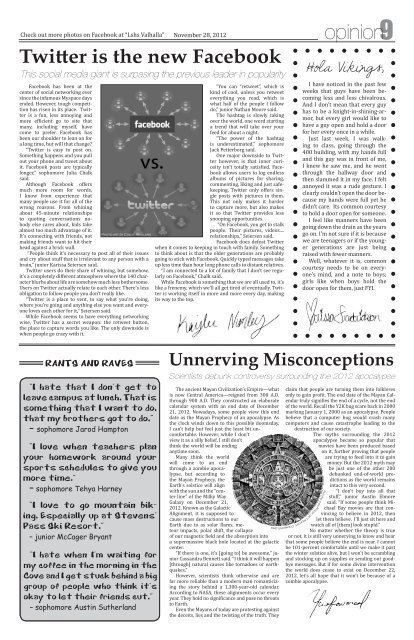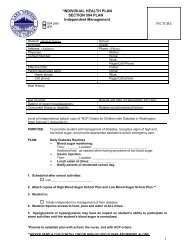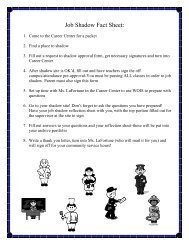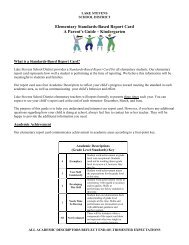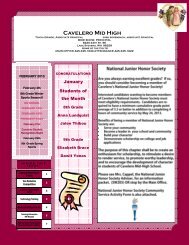Issue 4: November 28, 2 - Lake Stevens School District #4
Issue 4: November 28, 2 - Lake Stevens School District #4
Issue 4: November 28, 2 - Lake Stevens School District #4
You also want an ePaper? Increase the reach of your titles
YUMPU automatically turns print PDFs into web optimized ePapers that Google loves.
Check out more photos on Facebook at “Lshs Valhalla”<br />
<strong>November</strong> <strong>28</strong>, 2012<br />
opinion9<br />
Twitter is the new Facebook<br />
This social media giant is surpasing the previous leader in popularity<br />
Facebook has been at the<br />
center of social networking ever<br />
since the infamous Myspace days<br />
ended. However, tough competition<br />
has risen in its place. Twitter<br />
is a fun, less annoying and<br />
more efficient go to site that<br />
many, including myself, have<br />
come to prefer. Facebook has<br />
been our shoulder to lean on for<br />
a long time, but will that change<br />
“Twitter is easy to post on.<br />
Something happens and you pull<br />
out your phone and tweet about<br />
it. Facebook posts are typically<br />
longer,” sophomore Julia Chalk<br />
said.<br />
Although Facebook offers<br />
much more room for words,<br />
I know from experience that<br />
many people use it for all of the<br />
wrong reasons. From whining<br />
about 45-minute relationships<br />
to quoting conversations nobody<br />
else cares about, kids take<br />
almost too much advantage of it.<br />
It’s connecting with friends, not<br />
making friends want to hit their<br />
head against a brick wall.<br />
“People think it’s necessary to post all of their issues<br />
and cry about stuff that is irrelevant to any person with a<br />
brain,” junior Karissa Seiersen said.<br />
Twitter users do their share of whining, but somehow,<br />
it’s a completely different atmosphere where the 140 character<br />
blurbs about life are somehow much less bothersome.<br />
Users on Twitter actually relate to each other. There’s less<br />
obligation to follow people you don’t really like.<br />
“Twitter is a place to vent, to say what you’re doing,<br />
where you’re going and anything else you want and everyone<br />
loves each other for it,” Seiersen said.<br />
While Facebook seems to have everything networking<br />
wise, Twitter has a secret weapon: the retweet button,<br />
the place to capture words you like. The only downside is<br />
when people go crazy with it.<br />
Photo art by Chloe Rowland<br />
“You can “retweet”, which is<br />
kind of cool, unless you retweet<br />
everything you read, which is<br />
what half of the people I follow<br />
do,” junior Nathan Moore said.<br />
The hashtag is slowly taking<br />
over the world, one word starting<br />
a trend that will take over your<br />
feed for about a night.<br />
“The power of the hashtag<br />
is underestimated,” sophomore<br />
Jack Petterborg said.<br />
One major downside to Twitter<br />
however, is that inner curiosity<br />
isn’t totally satisfied. Facebook<br />
allows users to log endless<br />
albums of pictures for sharing,<br />
commenting, liking and just safekeeping.<br />
Twitter only offers single<br />
posts with pictures in them.<br />
This not only makes it harder<br />
to capture more, but also makes<br />
it so that Twitter provides less<br />
snooping opportunities.<br />
“On Facebook, you get to stalk<br />
people. Their pictures, videos....<br />
relationships,” Seiersen said.<br />
Facebook does defeat Twitter<br />
when it comes to keeping in touch with family. Something<br />
to think about is that the older generations are probably<br />
going to stick with Facebook. Quickly typed messages take<br />
up less time than hour long phone calls to distant relatives.<br />
“I am connected to a lot of family that I don’t see regularly<br />
on Facebook,” Chalk said.<br />
While Facebook is something that we are all used to, it’s<br />
like a frenemy, which we’ll all get tired of eventually. Twitter<br />
is working itself in more and more every day, making<br />
its way to the top.<br />
Hola Vikings,<br />
I have noticed in the past few<br />
weeks that guys have been becoming<br />
less and less chivalrous.<br />
And I don’t mean that every guy<br />
has to be a knight-in-shining-armor,<br />
but every girl would like to<br />
have a guy open and hold a door<br />
for her every once in a while.<br />
Just last week, I was walking<br />
to class, going through the<br />
400 building, with my hands full<br />
and this guy was in front of me,<br />
I knew he saw me, and he went<br />
through the hallway door and<br />
then slammed it in my face. I felt<br />
annoyed it was a rude gesture. I<br />
clearly couldn’t open the door because<br />
my hands were full yet he<br />
didn’t care. Its common courtesy<br />
to hold a door open for someone.<br />
I feel like manners have been<br />
going down the drain as the years<br />
go on. I’m not sure if it is because<br />
we are teenagers or if the younger<br />
generations are just being<br />
raised with fewer manners.<br />
Well, whatever it is, common<br />
courtesy needs to be on everyone’s<br />
mind, and a note to boys;<br />
girls like when boys hold the<br />
door open for them, just FYI.<br />
RANTS AND RAVES<br />
“I hate that I don’t get to<br />
leave campus at lunch. That is<br />
something that I want to do,<br />
that my brothers got to do.”<br />
– sophomore Jarod Hampton<br />
“I love when teachers plan<br />
your homework around your<br />
sports schedules to give you<br />
more time.”<br />
– sophomore Tehya Harney<br />
“I love to go mountain biking.<br />
Especially up at <strong>Stevens</strong>’<br />
Pass Ski Resort.”<br />
– junior McCager Bryant<br />
“I hate when I’m waiting for<br />
my coffee in the morning in the<br />
Cove and I get stuck behind a big<br />
group of people who think it’s<br />
okay to let their friends cut.”<br />
– sophomore Austin Sutherland<br />
Unnerving Misconceptions<br />
Scientists debunk controversy surrounding the 2012 apocalypse<br />
The ancient Mayan Civilization’s Empire—what<br />
is now Central America—reigned from 300 A.D.<br />
through 900 A.D. They constructed an elaborate<br />
calendar system with an end date of December<br />
21, 2012. Nowadays, some people view this end<br />
date as the Mayan Prophecy of an apocalypse. As<br />
the clock winds down to this possible doomsday,<br />
I can’t help but feel just the least bit uncomfortable.<br />
However, while I don’t<br />
view it as a silly belief, I still don’t<br />
think the world will be ending<br />
anytime soon.<br />
Many think the world<br />
will come to an end<br />
through a zombie apocalypse,<br />
but according to<br />
the Mayan Prophecy, the<br />
Earth’s solstice will align<br />
with the sun and the “center<br />
line” of the Milky Way<br />
Galaxy on December 21,<br />
2012. Known as the Galactic<br />
Alignment, it is supposed to<br />
cause mass destructions to our<br />
Earth due to as solar flares, meteor<br />
impacts, polar shift, the collapse<br />
of our magnetic field and the absorption into<br />
a supermassive black hole located at the galactic<br />
center.<br />
“If there is one, it’s [going to] be awesome,” junior<br />
Cassandra Bennett said. “I think it will happen<br />
[through] natural causes like tornadoes or earthquakes.”<br />
However, scientists think otherwise and are<br />
far more reliable than a modern man romanticizing<br />
the story behind a 1,300-year-old calendar.<br />
According to NASA, these alignments occur every<br />
year. They hold no significance and pose no threats<br />
to Earth.<br />
Even the Mayans of today are protesting against<br />
the deceits, lies and the twisting of the truth. They<br />
claim that people are turning them into folklores<br />
only to gain profit. The end date of the Mayan Calendar<br />
truly signifies the end of a cycle, not the end<br />
of the world. Recall the Y2K bug scare back in 2000<br />
marking January 1, 2000 as an apocalypse. People<br />
believe that a computer bug would crash many<br />
computers and cause catastrophe leading to the<br />
destruction of our society.<br />
The myths surrounding the 2012<br />
apocalypse became so popular that<br />
movies have been produced based<br />
on it, further proving that people<br />
are trying to feed into it to gain<br />
money. But the 2012 myth may<br />
be just one of the other 200<br />
debunked end-of-world predictions<br />
as the world remains<br />
intact to this very second.<br />
“I don’t buy into all that<br />
stuff,” junior Austin Elmore<br />
said. “If some people think Michael<br />
Bay movies are that convincing<br />
to believe in 2012, then<br />
let them believe. I’ll just sit here and<br />
watch all of [them] look stupid.”<br />
No matter whether the theory is true<br />
or not, it is still very unnerving to know and hear<br />
that some people believe the end is near. I cannot<br />
be 101-percent comfortable until we make it past<br />
the winter solstice alive, but I won’t be scrambling<br />
and stocking up on supplies or sending out goodbye<br />
messages. But if for some divine intervention<br />
the world does cease to exist on December 22,<br />
2012, let’s all hope that it won’t be because of a<br />
zombie apocalypse.<br />
photo courtesy of creative commons.org


